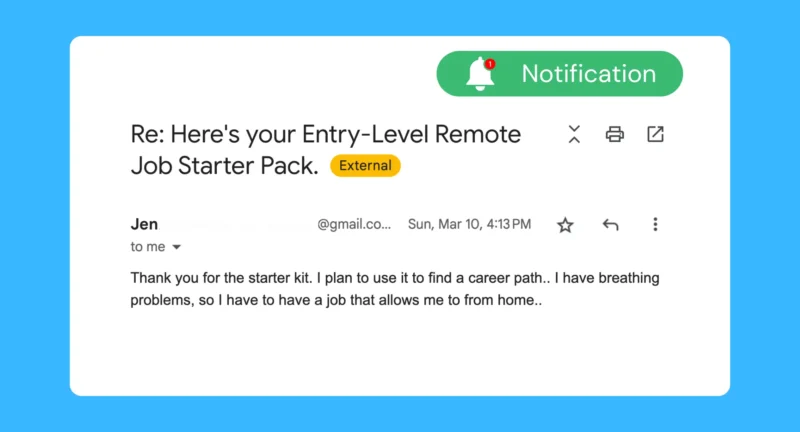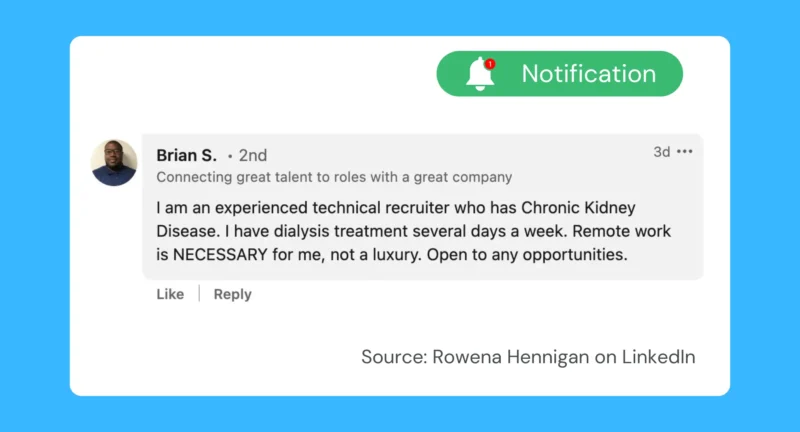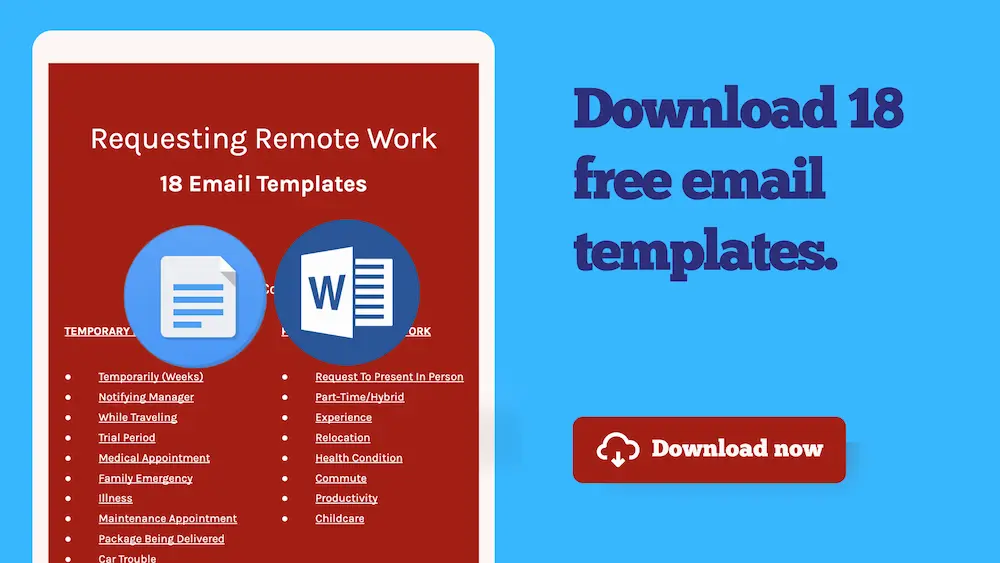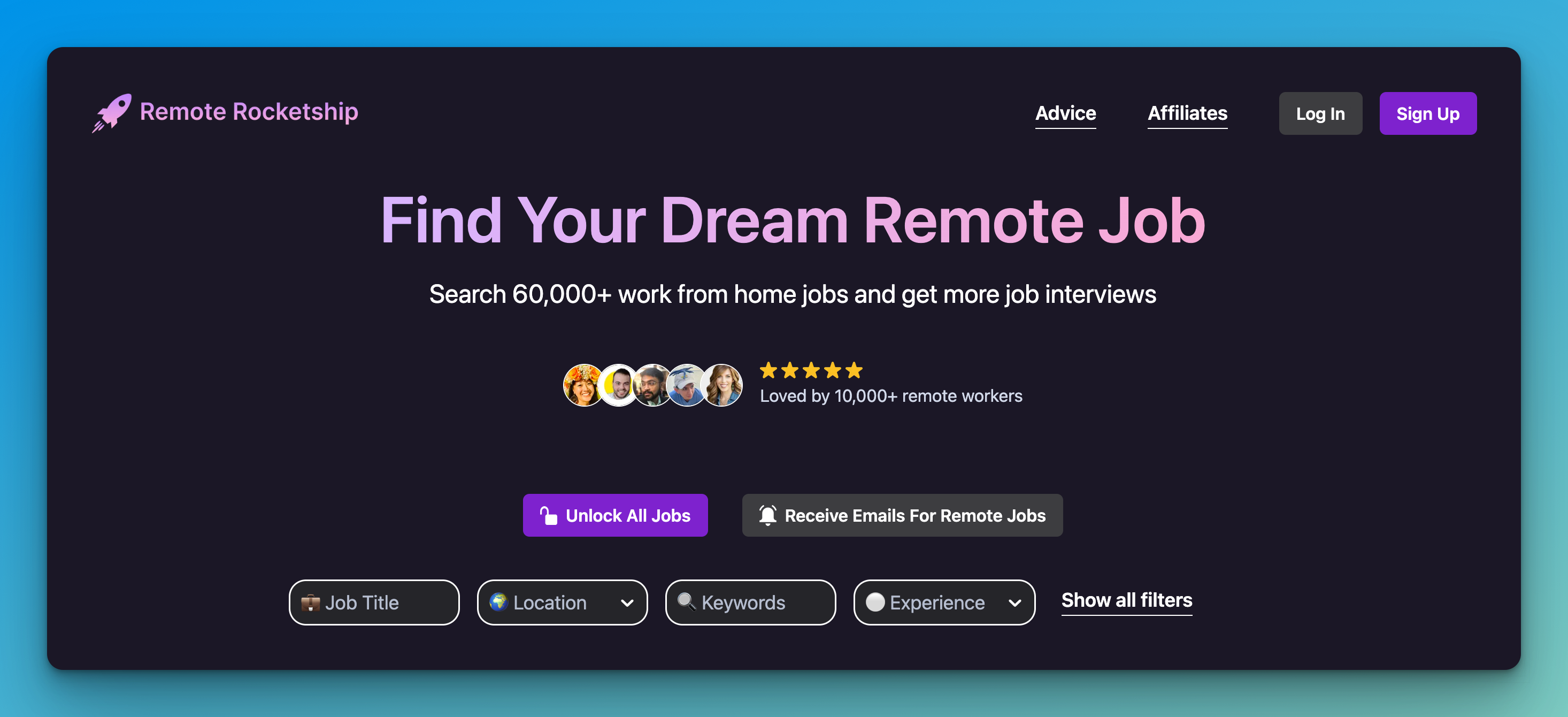26 Medical Reasons To Work From Home
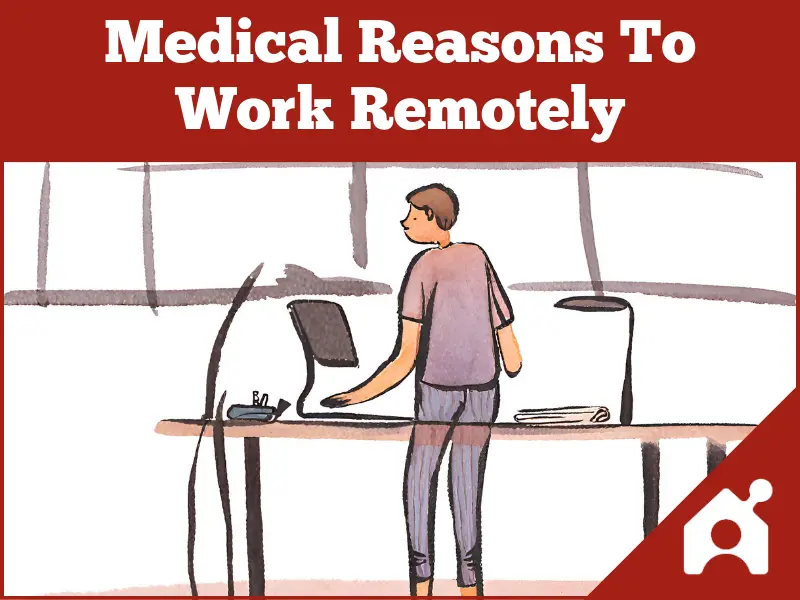
Many people have medical reasons to work from home. For them, remote work is a necessity, not a nice to have.
I recently received an email from someone who downloaded our entry-level remote job starter pack. This personal interaction changed my view on the promise of remote work. Remote work is not just a lifestyle upgrade or unlock, as it has been for me. For some people, remote work is a necessity. Here’s the email:
For Jen, the most important feature of her career is the ability to work remotely. My personal interaction with Jen made the concept click.
But others have covered this topic well for awhile. Rowena Hennigan on LinkedIn highlights real stories of people with disabilities who get access to income via remote work. Here’s an example from one of her posts:
These stories led me to write the master list of medical reasons to work from home.
Medical Reasons To Work From Home (By Category)
Table of Contents
Chronic Illness | Disabilities | Family Health | Improved Health | Mental Health | Recovery
Chronic Illness
1) Autoimmune Disorders
Individuals with conditions like lupus or rheumatoid arthritis may require more rest periods and flexibility, which remote work can provide.
2) Chronic Pain Management
Working from home allows those suffering from chronic pain to create a comfortable work environment and take necessary breaks without inconvenience.
3) Migraines
Enables a controlled, quiet environment to reduce triggers for migraines and headaches, with the flexibility to take breaks during episodes.
4) Respiratory Conditions
Avoids office environments that may exacerbate conditions like asthma or COPD due to pollution, dust, or mold.
5) Digestive Disorders
Provides access to dietary needs and restroom facilities without discomfort or stigma, beneficial for conditions like IBS or Crohn’s disease.
Disabilities
6) Permanent Disabilities
Makes employment accessible for people with mobility or health issues.
7) Visual & Hearing Impairments
Allows for customized setups with assistive technologies and communication tools that might not be as easily accessible in an office environment.
Family Health
8) Flexibility for Caregivers
Provides flexibility for those caring for children or elderly family members, reducing stress and improving overall well-being.
9) Reproductive Health Issues
Offers privacy and comfort for those experiencing menstrual pain, pregnant individuals, or those undergoing fertility treatments.
10) Breastfeeding
Offers privacy and the ability to follow a feeding schedule without the constraints or discomfort of a traditional office setting.
11) Single Parents without Childcare
Provides single parents the ability to work from home when childcare options are unavailable, ensuring they can supervise and care for their children. (Source: Rowena Hennigan on LinkedIn)
Improved Health
12) Healthier Breaks
Allows for more active and restorative break activities, like short walks or meditation.
13) Less Exposure To Illness
Reduces risk of catching common office illnesses by up to 80%.
14) Naps
A 20-minute nap can increase alertness and performance.
15) Physical Activity Integration
Encourages regular movement and exercise breaks, promoting physical health.
16) Reduced Stress & Burnout
Working from home can significantly reduce stress and burnout by eliminating the daily commute and allowing for a more flexible schedule.
17) Improved Air Quality
Home environments often have better air quality compared to many office settings, which can be beneficial for respiratory health.
18) Customized Ergonomic Setup
Individuals can tailor their workspace to their ergonomic needs, potentially reducing the risk of strain injuries associated with prolonged sitting.
19) Better Control Over Diet
Easier access to healthier food options and the ability to prepare meals can contribute to better dietary habits.
Mental Health
20) Mental Health Disorders
Supports individuals with anxiety, depression, or other mental health conditions by providing a less stressful and more controlled environment.
21) Social Anxiety
Reduces barriers for individuals with mental health challenges, promoting inclusivity.
22) ADHD
Remote work allows individuals with ADHD to create a personalized, distraction-reduced workspace that caters to their unique focus and productivity needs. (Source: Rowena Hennigan on LinkedIn)
Recovery
23) Injuries
Allows for individuals to heal from physical injuries like broken bones and sprains.
24) Short-Term (Temporary) Disabilities
Enables individuals who have recently acquired a disability to continue working in a tailored, accessible environment.
25) Cancer Recovery & Treatment
Allows those undergoing treatment or in recovery to work in a comfortable, controlled environment, accommodating medical appointments and needs.
26) War & Conflict
Allows individuals in conflict zones to continue working remotely, assuming they have internet access and a safe place to work.
How To Request To Work From Home For Medical Reasons
Below, you’ll find two ways to request remote work for health and medical reasons. We have one email template to request permanent remote work and another to request to work from home for a day or two.
At the bottom, you’ll find a way to download 18 email templates for requesting remote work.
Permanent Request: Email to WFH due to a health condition
Subject: Request for Permanent Remote Work
Hi [Boss’s first name],
I hope this message finds you well. I’m reaching out to discuss a matter that’s personal and professional.
Due to ongoing health concerns, specifically [mention the health issue, e.g., mobility challenges, heart disease, diabetes, etc.], my medical advisor has strongly recommended that I minimize [issues associated with condition].
Given these circumstances, and after careful consideration, I believe transitioning to a permanent remote work arrangement would be the most prudent course of action. This decision wasn’t made lightly but from a place of necessity, ensuring that I can maintain my health while continuing to contribute meaningfully to our team.
I understand this is a significant request and would like to discuss the plan and measurement for my remote role.
Could we set up a time to discuss this further? Here are some times I am free this week:
- [Day]: [Time slot]
- [Day]: [Time slot]
- [Day]: [Time slot]
Thank you very much for considering my request and for your understanding. I look forward to our discussion and to finding a path forward that supports both my health needs and our company’s goals.
Warm regards,
[Your name]
Temporary Request: Email to WFH due to illness
Subject: Request to Work from Home Due to Illness
Hi [Boss’s first name],
Unfortunately, I started feeling sick yesterday and it’s the same this morning.
It’s nothing too bad, just a [mention symptoms, e.g., fever, cough, etc.]. To err on the side of caution and to prevent spreading any germs, I am requesting to work from home for [today or the next few days].
I do plan to manage my current tasks and responsibilities from home.
Thank you for your understanding and support during this time. Please let me know if there are any concerns or additional information I should provide.
Best regards,
[Your name]
Email Templates: 18 Requests To Work From Home
See Also:
- Excuses To Work From Home
- Valid Reasons To Leave Work Early
- The Best Excuses To Get Out Of Work
- Excuses To Miss Work On Short Notice
Find Remote Jobs
I think Remote Rocketship is the best remote job board today. There are 60,000+ jobs to sort from for a fair price ($21 for a month).

